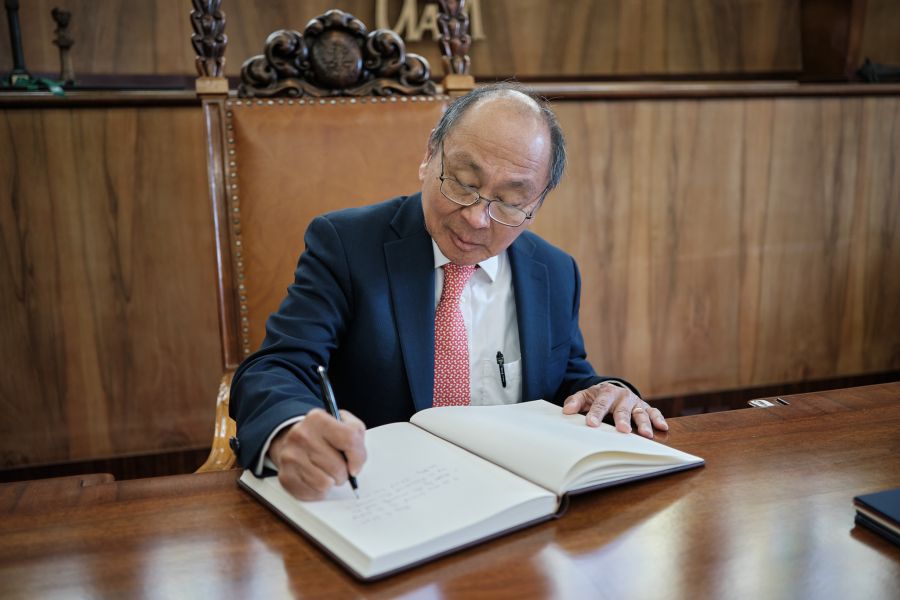A ceremony to award Prof. Francis Fukuyama - political scientist, philosopher and economist - with an Honorary Doctorate of the Adam Mickiewicz University, Poznań, was held on 16 May in the Lubrański Hall. Our guest also presented a lecture to the University community.
- "Let this distinction be a symbolic expression of gratitude for his invaluable contribution to the development of political thought, for his courage in raising significant, often inconvenient questions, for his insightful analyses and constant search for answers to fundamental questions concerning the future, and for his continuous reminder that the battle for freedom, dignity and democracy never ends," stressed Professor Bogumiła Kaniewska, Rector of the Adam Mickiewicz University, Poznań, during the ceremony.
Prof. Francis Fukuyama, receiving his honorary doctorate from AMU, expressed his belief that the current situation does not fill him with optimism: "Around 2008, the backlash against the third wave of democratisation began, and it has steadily deepened since then. One individual with a quite different reading on the events of 1989-1991 is Vladimir Putin." - he commented, adding - "For him, the collapse of the Soviet Union was not a cause for joy, but - as he has repeatedly stressed - one of the greatest tragedies of the 20th century. Since then, he has consistently sought to reverse the effects of this historic breakthrough. (...) The world we are now entering will no longer be founded on the liberal principles that for decades underpinned the international order formed after 1945. The current leadership in Washington seems to be moving towards recreating a 19th-century system based on the dominance of great powers, in which smaller states are forced to submit to their stronger neighbours. This type of model will not ensure global stability - the ambitions of the great powers will inevitably collide with each other," emphasised Professor Francis Fukuyama. He concluded his speech by stating: "A whole generation has grown up in Poland and the United States that has not encountered the realities of living under an authoritarian system and thus does not fully appreciate functioning in a free society. It is on us, who remember those times, to pass on this knowledge to the younger generations and to explain why we still believe that liberal democracy is the best available way to organise political life."
The Honorary Doctorate Promoter was Prof. Radosław Fiedler, to whom Prof. Francis Fukuyama's best-known publication was referred during the ceremony: - "The book The End of History and the Last Man, published in 1992, not only enriched the scientific canon but also penetrated the popular consciousness, becoming a symbol of the turn of the 20th and 21st centuries. This remarkable success, bringing the author worldwide recognition, sparked a debate on the essence of liberal democracy that continues to this day. The thesis, drawing inspiration from Hegel, that the collapse of communism could mark the end of major ideological conflicts, generated both enthusiasm and criticism, setting a benchmark for thinkers, politicians and public opinion. Generated enthusiasm and criticism, establishing a benchmark for thinkers, politicians and public opinion. Nowadays, this former optimism seems distant - liberal democracy, once seen as the pinnacle of human endeavour, is struggling to reverse itself, threatened by populism, polarisation and authoritarian tendencies, not least in the United States, where it may soon become a mere echo of its past glory. Aware of these transformations, Professor Fukuyama does not lose hope; in his later works, he stresses that history, although marked by the return of the demons of the past - nationalism, intolerance and chaos - does not have to end in collapse. After a period of turbulence, a renewed effort to rebuild liberal democracy, the only system capable of ensuring global peace and predictability, is possible. This evolution of views - from visions of triumph to reflections on the fragility of ideals - testifies to intellectual honesty and the ability to adapt to changing realities," said Professor Radosław Fiedler.
Francis Fukuyama was born on 27 October 1952 in Chicago. He studied political philosophy at Cornell University under the guidance of Allan Bloom. Later, he obtained a PhD in political science from Harvard University. He has taught at Johns Hopkins University and Stanford University, among others, where he currently serves as Olivier Nomellini Senior Fellow at the Centre on Democracy, Development, and the Rule of Law. Professor Fukuyama's career includes work at the RAND Corporation and as Deputy Director of the Policy Planning Team at the US Department of State during the pivotal period of the end of the Cold War. He is the author of the acclaimed book The End of History and the Last Man (1992), sparking an international debate on the future of liberal democracy. His work, translated into numerous languages, combines philosophy, history and political science to offer penetrating insights into contemporary social and political challenges. In his book The End of Man: Consequences of the Biotechnology Revolution (Our Posthuman Future: Consequences of the Biotechnology Revolution, 2002), Fukuyama addresses the impact of biotechnology on human nature, democracy and political stability. He analyses how developments in the biological sciences, involving genetic engineering or neuropharmacology, can shape individual identities and social relations, raising questions about the limits of technological progress and ethics. His work, one of the first such comprehensive studies of this issue, established him as a thinker ahead of his time, combining the humanities with reflection on the consequences of the biotechnological revolution. Professor Fukuyama has received various awards and honours for his work, including the Johann Skytte Prize in Political Science (2015), the Book Critics Award (1992), and, in 2024, the Riggs Prize for Lifetime Achievement in International and Comparative Public Administration. His reflections on the stability of institutions, the condition of democracy, and identity politics place him among the most significant intellectuals of the 21st century.
The AMU Senate adopted a resolution to confer an Honorary Doctorate to Prof Francis Fukuyama at its meeting on 31 March 2025.
photo by Przemysław Stanula, Władysław Gardasza and Natalia Kostić










